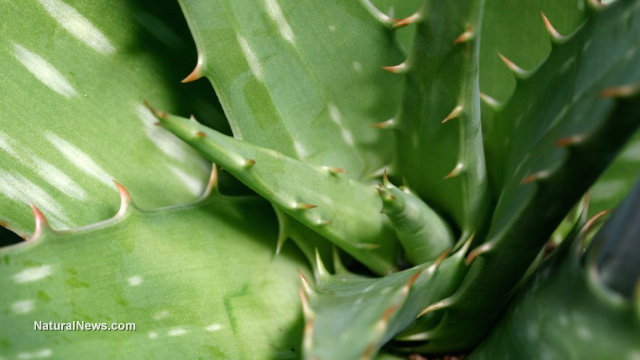Is your aloe vera gel fake? Here’s how to tell
03/25/2019 / By Amy Goodrich

Touted as the “plant of immortality” by ancient Egyptians and used by Cleopatra as her favorite royal beauty secret, very few natural products have such versatile applications as pure aloe vera gel.
One of the world’s most popular and useful healing herbs can be used to moisturize your skin, improve skin conditions such as psoriasis or eczema, and treat minor burns, cuts, scrapes, rashes, and insect bites. When taken internally, it acts as a potent antioxidant-rich superfood that can help fight infections, boost immunity, aid digestion, soothe chronic inflammation, and eliminate toxic waste materials from the digestive tract.
Given its growing popularity and no adverse side-effects, many commercial skin care brands are selling pure aloe vera gel or using it in their products to promote skin health. Aloe vera gel is rapidly becoming one of the most widely used natural products in the West. According to Chicago-based market researcher SPINS LLC, the total U.S. market for aloe products, including lotions, drinks, and vitamins, has grown to $146 million in the past year, an increase of 11 percent.
Fake aloe vera products are flooding the market
Its glorious fame as a cosmetic superstar, however, comes with one major problem, fake aloe vera products are flooding the market. Bloomberg reported that lab tests performed on store-brand aloe gel purchased at national retailers like Wal-Mart, Target, and CVS showed no indication of aloe vera at all. The four products tested were Wal-Mart’s Equate Aloe After Sun Gel with pure Aloe Vera, Target’s Up & Up Aloe Vera Gel with pure Aloe Vera, CVS Aftersun Aloe Vera Moisturizing Gel, and Walgreens Alcohol-Free Aloe Vera Body Gel.

Given the fact that no government watchdog agency ensures aloe products are genuine, manufacturers can put anything on the label, making it easier for them to add cheaper products and sell them under the premium aloe vera name. While it definitely makes sense to grow your own supply, there are several reasons why some people have to buy aloe vera gel.
For starters, once aloe vera has captured your attention you are probably going to use it a lot. Because it is such a versatile plant, some people simply don’t have the out- or indoor space to grow and cultivate enough plants to supply their need. Furthermore, Aloe plants love the heat and will not survive harsh winters unless you keep them warm. So your location might be holding you back. Or maybe you just don’t have a green thumb or enough time to spend on gardening.
While there are plenty of reasons why some people cannot cultivate their own supply, that doesn’t mean they have to miss out on one of nature’ s most famous wonder cures.
How to spot the fake stuff
Always buy pure, organic products from trusted suppliers and make sure to check the label. Due to its short shelf life, there will always be a few natural preservatives in the products. Therefore, it is important to do your research and make sure all ingredients are derived from natural sources.
While many companies claim to be 100 percent natural, their label usually tells a whole different story. As a rule of thumb, if there are more than six ingredients listed on the label, chances are pretty high your gel is not organic or all-natural.
Sources include:
Submit a correction >>
Tagged Under:
aloe vera, aloe vera gel, Cosmetics, healing plants, herbal remedy, medicinal plants, natural cures, natural medicine, plant cures, plant medicine, products, remedies, skin care, skin health
This article may contain statements that reflect the opinion of the author





















